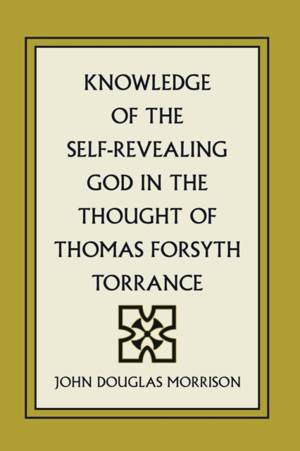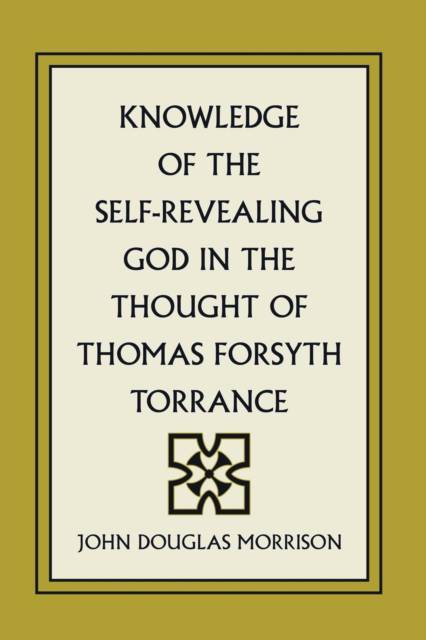
Je cadeautjes zeker op tijd in huis hebben voor de feestdagen? Kom langs in onze winkels en vind het perfecte geschenk!
- Afhalen na 1 uur in een winkel met voorraad
- Gratis thuislevering in België vanaf € 30
- Ruim aanbod met 7 miljoen producten
Je cadeautjes zeker op tijd in huis hebben voor de feestdagen? Kom langs in onze winkels en vind het perfecte geschenk!
- Afhalen na 1 uur in een winkel met voorraad
- Gratis thuislevering in België vanaf € 30
- Ruim aanbod met 7 miljoen producten
Zoeken
Knowledge of the Self-Revealing God in the Thought of Thomas Forsyth Torrance
John Douglas Morrison
Paperback | Engels
€ 59,95
+ 119 punten
Uitvoering
Omschrijving
This work examines Thomas Forsyth Torrance's concern for the modern re-entrenchment of dualism as it has negatively affected the Christian faith and the realist knowledge of God in Christ. Additionally, an analysis is made of Torrance's program to faithfully restore theological thinking, theological science, and true objectivity out of the Christocentric-Trinitarian self-disclosure of God via the modern return to critical realist epistemology in the physical sciences (e.g., Einstein, Polanyi). The study concludes with a critical examination of the adequacy and completeness of Torrance's endeavor (the problem of residual dualism) in the light of his own theological and redemptive concerns. John Morrison's book brings to light the contribution of the most important English language Protestant theologian of this century. Unlike others who have attempted to present Torrance's oeuvre by means of one or other of his guiding principles, Morrison draws them together into a coherent whole. Morrison's command of the ideas and spirit of Torrance is masterful. The splendid interrelations and potencies of Torrance's writing are unfolded in this highly competent work. Kurt Richardson, Gordon-Conwell Theological Seminary John Morrison has given the theological world a discerning analysis of the theology of one of the seminal thinkers of our time. T. F. Torrance's theology is so broad and deep in its scope that it is difficult to master, but Dr. Morrison has done an outstanding job of plumbing the depths of this great Scottish theologian.... This scholarly, comprehensive study is a major contribution toward helping us understand the theology of the great Edinburgh theologian. I. John Hesselink, Albertus C. Van Raalte Professor Emeritus of Systematic Theology, Western Theological Seminary Though Torrance has been hailed by some as 'one of the most substantial figures in recent Western intellectual history, ' he has also been called 'one of the most neglected' (Alisdair I. C. Heron). Morrison's new book seeks to correct this imbalance. This is a thorough examination of T. F. Torrance's theological writings; it is an erudite work that lays bare the very core of Torrance's thought, places it in context, traces its sources, and seeks to determine its implications for contemporary theology. Balanced as it is between homage and critical analysis, this book should prove indispensable for anyone who is interested in Torrance or in the ever-enduring and ever-changing dialectic between faith and reason. Carlos M. N. Eire, Professor of History and Religious Studies, Yale University This is a careful, accurate, thorough, and illuminating presentation of T. F. Torrance's thought together with various positive and negative assessments of his thought. It will be useful to anyone interested in systematic theology (and philosophical theology) because serious questions are raised and analyzed. This book definitely represents competent scholarship. The author wrestles with Torrance's position, presents his own critique of Torrance with a constructive proposal which, if he is correct, would lead in the direction Torrance has set for himself - toward a unified theology grounded in Christ and thus in the immanent Trinity. He makes his points well and does not shrink from difficult questions. All in all Dr. Morrison writes convincingly. Paul D. Molnar, Professor of Systematic Theology, St. John's University, New York John Douglas Morrison was born in Billings, Montana. He holds a B.A. from the University of Montana, an M.Div. and a Th.M. from Western Seminary, and an M.A. and a Ph.D. from the University of Virginia (Philosophical Theology). He has published journal articles on Kierkegaard, Calvin, Barth, and Torrance. He teaches theology and philosophy at Liberty University and Liberty Baptist Theological Seminary, Lynchburg, Virginia.
Specificaties
Betrokkenen
- Auteur(s):
- Uitgeverij:
Inhoud
- Aantal bladzijden:
- 402
- Taal:
- Engels
Eigenschappen
- Productcode (EAN):
- 9781597520850
- Verschijningsdatum:
- 7/02/2005
- Uitvoering:
- Paperback
- Formaat:
- Trade paperback (VS)
- Afmetingen:
- 155 mm x 229 mm
- Gewicht:
- 557 g

Alleen bij Standaard Boekhandel
+ 119 punten op je klantenkaart van Standaard Boekhandel
Beoordelingen
We publiceren alleen reviews die voldoen aan de voorwaarden voor reviews. Bekijk onze voorwaarden voor reviews.









